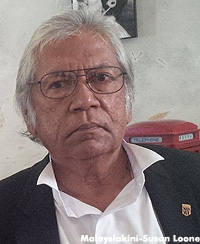“When poets speak the truth, can politicians stomach it?” Penang’s renowned lawyer-poet Cecil Rajendra is asking Deputy Prime Minister Ahmad Zahid Hamidi.
Rajendra raised the question in response to Zahid’s statement that poets should produce poems that incorporate relevant futuristic aspects with the past.
Zahid, who is also home minister, was quoted by Bernama as saying at the closing ceremony of the Sixth Pangkor International Poems and Folk Songs Festival that “Generation Y and Generation X no longer liked poetry as an art, but rather poetry that was relevant”.
Rajendra said he could not agree more with Zahid that poets should be realistic and that poetry should reflect local situations and the environment.
“I have been writing poems relevant to our society and environment for over 50 years and for my pains, I have been intimidated and interrogated by the police, Special Branch and had my passport impounded,” Rajendra, 74, said in an interview with Malaysiakini .
 In the 60s and 70s, Rajendra (
photo
), who celebrated the 50th anniversary of the publication of his first book, Embryo, this year, wrote poems about apartheid, Nelson Mandela and the Vietnam War - for which he was castigated as a communist sympathiser.
In the 60s and 70s, Rajendra (
photo
), who celebrated the 50th anniversary of the publication of his first book, Embryo, this year, wrote poems about apartheid, Nelson Mandela and the Vietnam War - for which he was castigated as a communist sympathiser.
At the time, the late Mandela - who later served as president of South Africa until his death in 1999 - was branded a communist terrorist. The African National Congress that he led was then marked as a communist organisation.
Rajendra, who founded the Penang Legal Aid Centre, recalled that those who opposed the Vietnam War, which Malaysia supported, were also branded as pro-communists.
Recognised for pioneering legal work
“I was questioned by the Special Branch as to why I allowed my poems to be published in the official organ of the African National Congress,” he said.
He went on to win the first Malaysian ‘Lifetime Humanitarian Award’ in recognition of his “pioneering legal aid work and exemplary poetry” in 2005.
“In the 70s and 80s, when I wrote about oppressive security laws in Malaysia, Singapore, Indonesia, Korea and the Philippines, and in particular, for my poem ‘Animal and Insect Act’, I was once again “interviewed” by the Special Branch.
“My publisher, Choice Books, was hauled up by the Home Ministry and forced to withdraw all books from circulation,” he said.
Incidentally, the 'Animal and Insect Act' has been published in 10 countries, with the support of Amnesty International in a calendar and anthology format, which garnered more than three million hits on the Internet.
Ironically, too, when the ISA was repealed in 2013, the Malaysian Human Rights Commission (Suhakam) gave Rajendra a human rights award.
However, in the 80s and 90s, when he penned radical poems on the destruction of the environment and wildlife, he was branded “anti-loggist" and had his passport impounded.
His passport was only returned after international outcries in four continents.
“Ironically, one of the poems cited for the confiscation of my passport - 'Requiem for a Rainforest' - I am told is now being taught in schools here,” he said, laughing.
“So when the minister calls for realistic poems relevant to our times and environment, my question is: when poets speak the truth, can the powers- that-be stomach it?” Rajendra asked.
“The two most important issues of today are religious extremism and climate change. Unlike poets, politicians are notoriously shortsighted and cannot see beyond a five-year term,” he said.
“Certainly, poets should dedicate their talents and services to being witnesses of their time and environment and, at all costs, should refrain from writing propaganda for politicians!”

